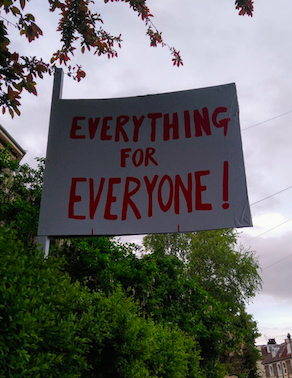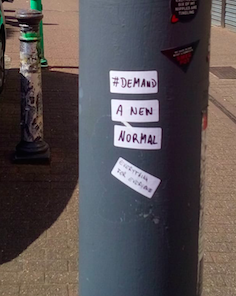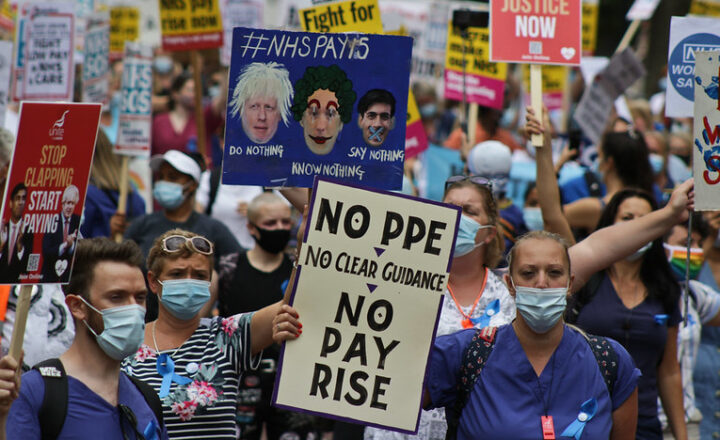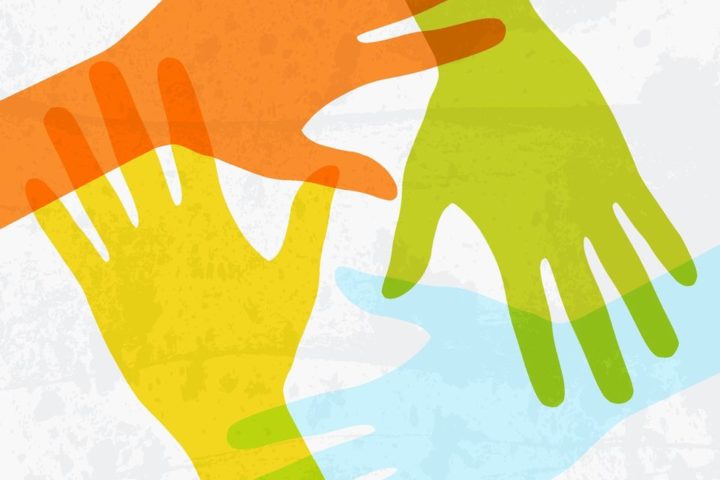Republished from Plan C
By Olly, Plan C Covid-19 Cluster and Plan C Bristol.
Now is the time to make very clear what we need and want… we do not want the ruling class’s version of the ‘new normal’. We are creating a #DemandANewNormal platform as one part of the collective response to the corona-crisis. While groups across the world are already working together, this platform hopes to contribute toward the convergence of all our struggles, sharing of ideas and creating a radical new normal.
During the coronavirus pandemic, Plan C has published a number of articles, started a self-education platform and now we are creating a #DemandANewNormal campaign.
We have started this journey under the umbrella of an internationalist anti-authoritarian, anti-capitalist approach, focusing on the following themes:
-Demands for the building blocks of a new, better world.
-The strength of mutual aid versus ‘charitable gestures’.
-A feminist social reproduction perspective, highlighting the importance of reproductive work as the making of both labour power and life.
-Increase state power to control us, including increased surveillance.
-The inability of a capitalist world system to deal with a pandemic – capitalism being largely responsible for its emergence and unfettered spread.
-The unwillingness of governments and capitalists to halt the spread of coronavirus because doing so would reduce their profits and jeopardise the capitalist system itself.
Who’s demanding what?
There is nothing intrinsically revolutionary or radical about making demands. Demands are made frequently by property developers, religious organisations, people who like hunting animals and bigots of every kind.
We don’t even think that it’s particularly radical to make demands of government that serve only to mitigate the worst effects of coronavirus. However, the process of making such demands can result in the following:
-Some slight, temporary improvements to the lives of working-class people.
-Help to highlight the massive injustices and gross hypocrisies that living under capitalism puts us under.
-Raising people’s consciousness and get them thinking, bringing them together. Sometimes they can trigger a ‘lightbulb moment’ that cuts through the murk of day-to-day drudgery, in which we realise that of course carers should be better paid, everyone should get the healthcare they need, or that no one should face homelessness. And come to that, why should I get paid so little when my boss has three homes and drives around in a Tesla?
-Show us just how little the state will do to meet our very reasonable demands.
-Help us realise we can self-organise.
So we started our Covid-19 journey with pandemic demands and an article on pandemic inequalities. However, mitigation demands in the ‘traditional’ Left or trade union sense of making demands of government, local government, the boss, the employer, can be met easily without radical or systemic change, particularly in times of crisis, like right now. After all, we have seen the British government introduce some welfare benefits and homelessness ‘improvements’ during the pandemic. Perhaps, if these had been suggested in Parliament before the corona-crisis hit us, they’d have been laughed out of Westminster as the preposterous and unaffordable wish list of a socialist nanny state. We’ll leave it to you to consider why government has decided to open the previously non-existent money pot but we suspect that part of the reason is to avoid social unrest, claw back a bit of popularity in the face of absolutely shit planning for the pandemic, and keep the economic wheels turning.
Instead directional demands call for a whole new socio-economic direction: not for a few crumbs from the rich’s dinner table but for control of the whole bakery. In other words, Everything for Everyone!
We need to make demands to create a vision of a ‘New Normal’, one which is not like the normal we have experienced before.

We need to make:
-Demands of ourselves – Are we prepared to put up with the racism, sexism, classism, disablism, ageism and other divide and rule tactics that we’ve grown up with and daily have to defend ourselves against?
-Demands of our groups and collectives of whatever shape and form they take.
-And yes, demands of the ruling class. Demands that don’t just ask for a few coins to be thrown into our begging bowl, but demands that make it clear what we want, what we need and what we will do to get them.
Is the patient recovering?
During the coronavirus pandemic, meaning right now, states across the world and capitalist corporations are planning for ‘recovery’, by which they mean getting themselves back in the
driving seat and working through how they want power and capitalism to be readjusted. This planning is almost certainly going to include international austerity and that will be brutal unless we stop such plans in their tracks.
‘Planning for recovery’ is unlikely to focus on climate justice, the proper redistribution of wealth, a universal basic income, gender equalities, affordable decent housing and food security for all, a fit-for-purpose healthcare system, etc. In fact, we can imagine that all these fundamental issues for humanity and our planet will be shoved to the bottom of the list and that there will be a lot of bluster concerning ‘the priority being getting us back on our feet and making our economy recover is the only way to do that’.
We suspect very strongly that their ‘new normal’ will be about getting the most out of us as they can, offering as little to us as possible, to balance capital’s post-pandemic bank account and profit margins.
They know, as we know, that coronavirus has shown the deep cracks under the wallpaper of capitalism and this makes it all the more important for us to be clear about what we see as ‘new normal’. This is why making clear demands isn’t just about reducing the amount of crap that we have to wade through, especially those of us who have low incomes and are vulnerable for any number of reasons. It’s also about setting out some of the elements of the world we want to see. Fundamentally, demands for our ‘new normal’ should carry implicitly the message:
Your normal was brutal. We want a better, just, sustainable normal for everyone.

And here’s an example: ‘A living wage for housework and home carers.’ This is a reasonable demand, one that many would agree with. But it is actually a directional demand, because it is virtually impossible for capitalism to deliver, because this idea would make the cost of reproductive labour to capital skyrocket and it simply doesn’t fit a model which regards humans as profit-generating units, rather than carers and nurturers, however important this is to humanity.
Mutual aid
Our Covid-19 journey has also explored the practice of mutual aid. Our perspective is that mutual aid is as ancient as human culture: exchanging labour and resources for the benefit of groups and individuals alike. Yet we of course accept that, although mutual aid happens every day in millions of different ways, all over our world, it doesn’t tend to have a very high profile in the media or in government circles, because it points to a major and very sensible and sustainable route to human organisation that defies both capitalist ‘logic’ (produce, buy, sell, profit, produce, buy, sell, die) and the social ‘norms’ and structures that governments establish and wish to control.
Small or larger mutual aid groups – and these can be neighbours on a housing estate or groups of friends, not just old lefties – have main traits in common: they are autonomous and they are collective, usually with an open model of voluntary cooperation. They tend to have non-hierarchical, non-bureaucratic structures, with members controlling all resources and no external financial or ‘professional’ support. They are member-led and member-organised.
Of course, sometimes there are problems, especially because mutual aid flies in the face of capitalist organisation, which often puts the interests of the individual above those of the group. But ironing out difficulties is all part and parcel of moving to a better, more just and sustainable world.
Many of us are involved in the mutual aid groups that have sprung up across the world in response to the Covid-19 pandemic, including Covid-19 Mutual Aid UK (https://covidmutualaid.org/) and USA Covid-19 Mutual Aid (https://www.usacovidmutualaid.org/) These groups serve as a central network for community members to connect with and support each other. They also show very clearly that, despite the kicking that capitalism gives us, the principles of mutual aid and the desire to help each other out during the worst health crisis for 100 years are very much alive and well.
Dual power
When and if mutual aid becomes part of our ‘new normal’, when people are acting with and for each other in the interests of all, with no profit generated and no state involvement, it might be possible to move towards dual power. This term was first used to describe the situation in Russia in 1917: the Soviets (workers’ councils) versus the social democrat provisional government of the day. Although the Bolsheviks used the power of the Soviets to smash the government and effectively become the government themselves, the new form of state power, the idea of dual power continued and informed the so-called Chinese ‘revolution’ of 1949. More recent is the example of Sinn Féin, in the north of Ireland before the Good Friday agreement, when they were effectively in a position of dual power versus the British state. However, more recent still and certainly more relevant to anti-authoritarian anti-capitalist politics is the example of the Zapatistas of Chiapas, Mexico; and of course the Rojava revolution in Northern Syria / Western Kurdistan: the establishment of the Autonomous Administration of North and East Syria in 2018. Dual power includes a dual strategy of:
-Public resistance to oppression (counter-power);
-Building cooperative alternatives (counter-institutions).

Public resistance to oppression encompasses all the direct action and protest movements that fight authoritarianism, capitalism, racism, sexism, homophobia, and other institutionalised oppressions. Building cooperative alternatives recreates the social and economic relationships of society to replace competitive with cooperative structures.
Please don’t dismiss the aspiration of moving further, from demands to mutual aid and cooperation; and then on to something approaching dual power. After all, Zapatista territories and Rojava exist right now and not in a dusty history book.
#DemandANewNormal
The Left – meaning anti-capitalist anti-authoritarians – has a long history of being reactive. We are generally quite expert in pointing out how capitalism, governments and the state function internationally to exploit the majority of the world’s humans and appropriate most of the world itself, including most of its non-human species, extracting labour and resources to maximise profit and power at the expense of the Earth and its inhabitants. Countless thinkers, academics and commentators have provided minute detail about the huge hypocrisies and massive dangers of the way our world is ordered and, time after time, have made an extremely strong case for a very different ‘normal’.
However, we’re not always so smart at setting out exactly what that normal should be, what it should look like and what would need to change, from the ways in which we produce things like food, housing, towns, cities, transport and so on, to the issues of how we organise and govern very different arrangements.
This is a crucial time for building a vision of a ‘new normal’. Radical demands for permanent policies of care and solidarity have emerged all over the world. After a long time in isolation and fear, the desire for a ‘new normal’ is very strong. A recent large poll found that having enjoyed cleaner air, better food and stronger social bonds, only 9% of Britons want to go back to the way things were. People are experiencing enormous change – they now know that change is possible. They want a ‘new normal’.
On a more worrying note, in many countries across the world, the right-wing will seize this as an opportunity to profit from the crisis and the chaos that it has generated. They have the power of the state, capital and the media behind them. This new normal has the potential to be worse than the old. So, it is up to us to imagine, organise and build a new normal based around principles of solidarity, social justice and progressive transformation.
We are creating a #DemandANewNormal platform as one part of the collective response to the corona-crisis. While groups across the world are already working together, this platform hopes to contribute toward the convergence of all our struggles, sharing of ideas and creating a radical new normal.
We have three hopes for what this project might achieve:
That it offers the Left a space to start the necessary process of collaboration. By sharing our visions for the new normal and experiences of organising during the lockdown, we can see where interests and struggles converge and align.
-We hope that a clear, positive vision can develop from the co-ordination and dialogue that this platform will help develop. We know all struggles are deeply interconnected and we can only overcome obstacles when we work together.
-Promote access to education. Groups around the world have been offering a range of radical webinars and skill shares, and by drawing our movements together new audiences can be found and movements built.
-In our efforts to care for one another, we are learning that we do not need the state or the market to care for us.We are learning how to become ungovernable. It is this that is making us powerful to demand OUR New Normal.







